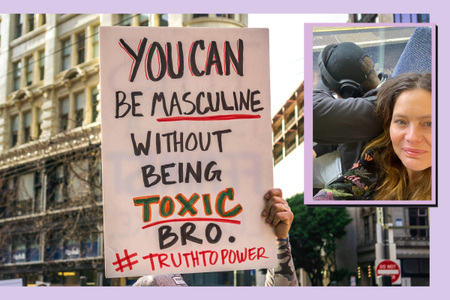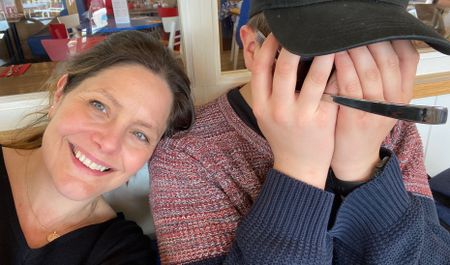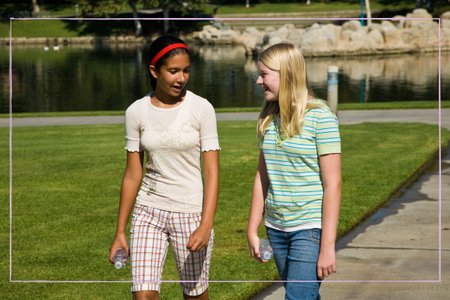Parenting researcher reveals how to talk to your kids about achievements in a healthy, non-toxic way
Celebrating your kids' achievements is always important, but there's other things to worry about too

A Harvard-trained toxic-parenting researcher has revealed the one thing she no longer asks her kids when they come home from school and it's all to make sure they can talk to her about their achievements in a healthy way.
Every milestone in a child's life is cause for celebration, whether it's their first steps, their first word, their first day of school, or a brilliant grade on an important test.
It feels important to mark these big moments but one parenting expert has found that it might actually be harmful to do so. That's because by being overly-focused on your child’s achievements, you could also be subconsciously sending them a very harmful message - that their value as a person is contingent on their academic performance.
Award-winning journalist and parenting researcher Jennifer Breheny Wallace, who wrote the book Never Enough: When Achievement Pressure Becomes Toxic — and What We Can Do About It, says that by prioritising a child's academic achievements over their other qualities as a person is detrimental and her research into the stress it can cause for kids has led her to make a huge change to her own parenting style.
"As much as you might worry about how your child fared on a big test, or if they earned a spot on a varsity sports team, you risk compounding your teen’s anxiety by asking probing questions as soon as they walk in the door," she told CNBC News.
"Achievement culture is becoming toxic. What I mean by that is: When our sense of self is tangled up in our achievements, we can’t separate ourselves — our inherent worth — from our external achievements or external failures.”
It's not just Wallace who has uncovered this. Research by Erica Komisar, a clinical social worker, psychoanalyst and parenting expert, also revealed that many parents today are pushing their children too hard and creating more anxiety for them as they fail to separate academic achievements from their worth as a person.
GoodtoKnow Newsletter
Parenting advice, hot topics, best buys and family finance tips delivered straight to your inbox.
So what did Wallace do? She didn't stop pushing her children to do well, or stop asking about how that big test went. She simply just reframed her questions and learnt to talk to her kids about their achievements in a healthier way.
“When my kids come in the door, instead of asking them, ‘How’d you do on the Spanish quiz?’ — which I used to do before I wrote the book — I now ask them, ‘What did you have for lunch?’” says Wallace. “I lead with lunch. I talk about things that have nothing to do with their achievements.
“Guess what? My kids are going to tell me. It’s on their minds,” she says. “They don’t have to think that I’ve been worrying all day about one Spanish quiz. Instead, they should be getting the messaging from me that I care about them as a whole person.”
One specific tip that Wallace picked up from a psychologist she interviewed for her book is to try and limit potentially stressful conversations with your kids about their academic performance to just 'one hour over the weekend.' While you're talking to them, look out for subtle ways your child expresses anxiety that you might have missed so you can know when you're pushing them too far and, if it gets too much, try out these simple and effective ways to manage stress.
Charlie Elizabeth Culverhouse is a news writer for Goodtoknow, specialising in family content. She began her freelance journalism career after graduating from Nottingham Trent University with an MA in Magazine Journalism, receiving an NCTJ diploma, and earning a First Class BA (Hons) in Journalism at the British and Irish Modern Music Institute. She has also worked with BBC Good Food and The Independent.












-
 The 'incredibly helpful' 30-second rule – liked by nearly 2 million people – that your kid needs to know about
The 'incredibly helpful' 30-second rule – liked by nearly 2 million people – that your kid needs to know aboutThis useful piece of advice is worth remembering for all of us, not just our children
By Adam England Published
-
 Strong willed teens don’t need to be ‘tamed,’ they need to be nurtured - expert shares how
Strong willed teens don’t need to be ‘tamed,’ they need to be nurtured - expert shares howIt might surprise parents when their strong willed child remains that way into the teenage years - instead of crushing this part of their temperament, an expert shares how to nurture it.
By Lucy Wigley Published
-
 We ask teenagers what they wish their parents had done differently, and their answers are surprisingly candid
We ask teenagers what they wish their parents had done differently, and their answers are surprisingly candidA lot of parents will wonder if their kids wish they'd done some differently, but never get to find out. We got to ask some teens this question, and here's their candid answers.
By Lucy Wigley Last updated
-
 9 things I'm doing to teach my teenage son about 'toxic masculinity'
9 things I'm doing to teach my teenage son about 'toxic masculinity'Influencers are having a worrying impact on young boys' behaviour and attitudes
By Debra Waters Published
-
 I have a 13-year-old son - here’s what I’ve found most difficult about parenting a teenager, and you might be able to relate
I have a 13-year-old son - here’s what I’ve found most difficult about parenting a teenager, and you might be able to relateMonosyllabic responses from our teenagers may sting, but it's normal
By Debra Waters Published
-
 What is sadfishing? How to talk to your teen about this online trend, and the impact on mental health
What is sadfishing? How to talk to your teen about this online trend, and the impact on mental healthHave you been wondering what is sadfishing? An expert shares why parents should have a conversation with their teens about this potentially dangerous practice.
By Lucy Wigley Published
-
 9 ways to let teenagers take positive risks this summer, according to an expert
9 ways to let teenagers take positive risks this summer, according to an expertHelp boost your teen's independence and confidence this summer with these small, manageable risks.
By Adam England Published
-
 What are 'Mickey Mouse' degrees? Expert reveals why this term is unhelpful for teens making higher education choices
What are 'Mickey Mouse' degrees? Expert reveals why this term is unhelpful for teens making higher education choicesWhat are 'Mickey Mouse' degrees? For teens embarking on those all-important higher education choices, it's an unhelpful term.
By Lucy Wigley Published